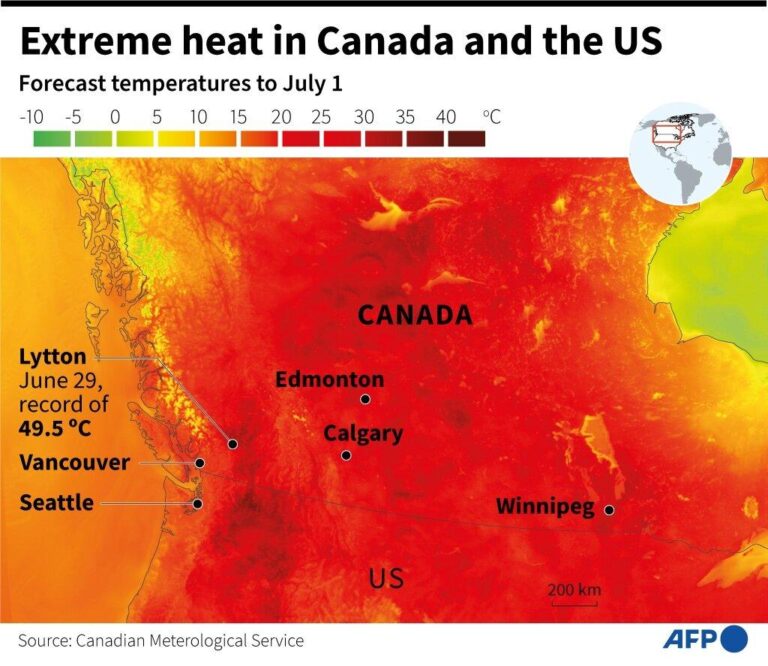Canada is grappling with an intense heatwave as soaring temperatures bake large parts of the country, while thick wildfire smoke blankets the skies, severely impacting air quality. The unprecedented combination of extreme heat and hazardous pollution has prompted health officials to issue a nationwide alert, urging residents to take precautions amid growing concerns over public health and safety. This dual climate crisis underscores the escalating challenges posed by climate change, as communities across Canada strive to cope with the dangerous conditions.
Canada Faces Record-Breaking Heat Wave Amidst Widespread Wildfire Smoke
Across Canada, an unprecedented surge in temperatures has shattered previous records, with mercury levels soaring well above seasonal averages. Cities from Vancouver to Montreal are grappling with the relentless heat, which has not only strained power grids but also heightened the risk of heat-related illnesses. Experts warn that vulnerable populations, including the elderly and those with pre-existing conditions, are at heightened risk during this extreme weather event. In conjunction with the soaring temperatures, vast regions are blanketed by thick wildfires smoke, creating hazardous air quality that has prompted health advisories nationwide.
Authorities have issued a series of urgent warnings and guidelines to mitigate health risks, emphasizing the importance of staying indoors and minimizing physical exertion. Public health officials advise residents to:
- Use air purifiers or stay in air-conditioned environments to reduce smoke inhalation.
- Stay hydrated and avoid prolonged exposure to direct sunlight.
- Monitor local air quality indexes and heed official health alerts.
| City | Current Temp. (°C) | Air Quality Index (AQI) |
|---|---|---|
| Vancouver | 38 | 185 (Unhealthy) |
| Toronto | 40 | 160 (Unhealthy) |
| Montreal | 39 | 170 (Unhealthy) |
Health Officials Issue Nationwide Alerts Advising Vulnerable Populations to Stay Indoors
Health authorities across Canada have escalated warnings to protect the most vulnerable as hazardous air quality levels persist due to thick wildfire smoke blanketing vast regions. Officials urge seniors, children, pregnant women, and those with respiratory or cardiovascular conditions to avoid outdoor activities and remain indoors as much as possible. The combination of extreme heat and smoke exposure poses heightened risks, including exacerbated asthma symptoms, increased hospital admissions, and long-term respiratory damage.
To mitigate health impacts, the government has recommended the following precautions:
- Use HEPA air purifiers or air conditioning with clean filters to improve indoor air quality.
- Avoid strenuous physical exertion or outdoor exercises until air clears.
- Stay hydrated and monitor for signs of heat exhaustion and smoke-related respiratory issues.
- Seek medical attention promptly if experiencing difficulty breathing, chest pain, or severe discomfort.
| Population Group | Recommended Precaution | Risk Level |
|---|---|---|
| Elderly (65+) | Stay indoors; avoid heat exposure | High |
| Children (<12 years) | Limit outdoor activities; use masks | High |
| Pregnant Women | Maintain indoor air quality; hydrate | Moderate |
| Respiratory Patients | Follow medication; avoid smoke | Very High |
Experts Recommend Air Quality Precautions and Hydration Strategies to Combat Extreme Conditions
Health experts across Canada are urging citizens to take immediate measures to safeguard themselves against the dual threats of intense heat and deteriorating air quality from the ongoing wildfires. With smoke levels soaring and temperatures reaching unprecedented highs, authorities recommend staying indoors during peak heat hours and using air purifiers or air conditioners to maintain clean air environments. Vulnerable groups, including children, the elderly, and those with respiratory conditions, should exercise extra caution. Wearing N95 masks outdoors is advised when air quality indexes show hazardous levels, as ordinary masks do not provide adequate protection against fine particulate matter.
Hydration plays a critical role in combating these extreme conditions. Experts stress drinking plenty of water throughout the day to prevent heat exhaustion and dehydration. Consuming electrolyte-rich fluids can help maintain balance in the body and support vital functions under stress. The following table summarizes key precautionary measures to follow during this crisis:
| precaution | recommended action |
|---|---|
| Indoor air quality | Use HEPA filters; keep windows closed |
| Outdoor protection | Wear N95 masks when smoke is heavy |
| Hydration | Drink 8+ glasses of water daily; include electrolytes |
| Temperature management | Avoid outdoor activities during 11 AM-5 PM |
| Emergency preparedness | Keep emergency kit and medications accessible |
The Way Forward
As Canada continues to grapple with soaring temperatures and pervasive wildfire smoke, health officials urge residents to take necessary precautions amid the ongoing crisis. With air quality deteriorating across multiple provinces and heatwaves showing no signs of abating, authorities remain on high alert, emphasizing the urgent need for coordinated responses to protect vulnerable populations. The situation underscores the growing challenges posed by climate change and the critical importance of preparedness in safeguarding public health.




